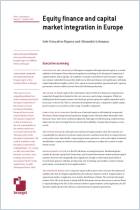Melden Sie sich bei getAbstract an, um die Zusammenfassung zu erhalten.

Melden Sie sich bei getAbstract an, um die Zusammenfassung zu erhalten.
Karel Lannoo and Apostolos Thomadakis
Europe’s Capital Markets Puzzle
CEPS, 2020
Was ist drin?
European efforts toward an integrated capital market appear to be regressing.
Recommendation
In this incisive report for financial professionals, researchers Karel Lannoo and Apostolos Thomadakis argue that, despite its need for a unified capital market, the European Union’s attempts at integration are proceeding in fits and starts. Reduced retail fund costs, greater market unity and better capital market accessibility for small and large concerns alike are all essential, their scholarly paper makes clear, particularly in the wake of the United Kingdom’s departure from the European Union.
Summary
About the Authors
Karel Lannoo is the CEO of the Centre for European Policy Studies (CEPS), where Apostolos Thomadakis is a researcher.





















Comment on this summary